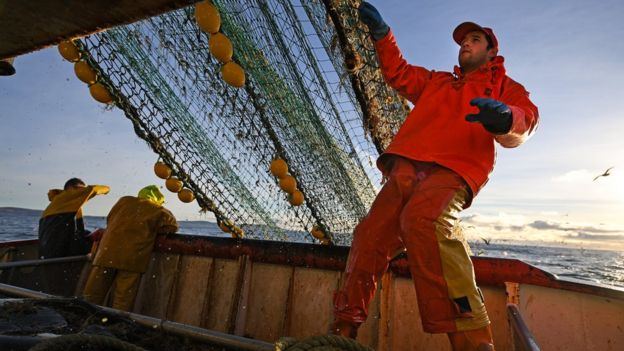
This article is more than
5 year oldSpeaking after the latest round of talks, Michel Barnier said he was "disappointed" and "concerned".
His UK counterpart David Frost spoke of "little progress", amid differences on fisheries policy and state aid rules.
The EU has said it would like to agree a deal by October so it can be approved by the European Parliament before the post-Brexit transition period expires.
The transition period ends on 31 December and, if a deal has not been secured by then, the UK would have to trade with the EU on WTO (World Trade Organization) terms.
This means most UK goods would be subject to tariffs until a free trade deal was ready to be brought in.
The UK has said it will not extend talks if an agreement cannot be reached by the December deadline.
In a statement released after the seventh round of talks, Mr Frost said the EU had made it "unnecessarily difficult" to make progress by insisting that differences over state aid and fisheries have to be resolved before "substantive work can be done in any other area of the negotiation, including on legal texts".
In a bid to break the deadlock, the UK has presented the EU with a draft legal text for a free-trade agreement.
Mr Frost, who reports directly to Prime Minister Boris Johnson, said the UK was seeking a deal which "ensures we regain sovereign control of our own laws, borders, and waters".
"When the EU accepts this reality in all areas of the negotiation, it will be much easier to make progress," he said.

A senior UK negotiating official added that a deal was "still possible but not that easy to get there".
They also said it was "frustrating" that the EU "says Brexit means Brexit... yet they want us to continue with arrangements as though we were still [an EU] member".
"Frustrating that they want us to move towards their position on fishing and state aid before doing anything else."
Speaking at a press briefing in Brussels, Mr Barnier accused the UK side of "wasting valuable time", suggesting the draft text was "useful" but downplaying its significance in reaching any agreement.
"Too often this week it felt as if we were going backwards more than forwards," he said.
"Given the short time left, what I said in London in July remains true, today at this stage, an agreement between the UK and EU seems unlikely."
While there had been progress on energy co-operation, participation in union programmes and anti-money laundering, on the subject of access to UK and EU fishing waters, there had been "no progress whatsoever".
He also said the EU's demand for a level-playing field - one of the other sticking points in negotiations - was "a non-negotiable pre-condition to grant access to our market of 450 million citizens".
A level-playing field is a trade policy term for a set of common rules and standards that prevent businesses in one country undercutting their rivals and gaining a competitive advantage over those operating in other countries.
The EU has been insistent there should be level-playing field for workers' rights, environmental protection, taxation and state aid.
The next round of talks is due to begin on 7 September in London.